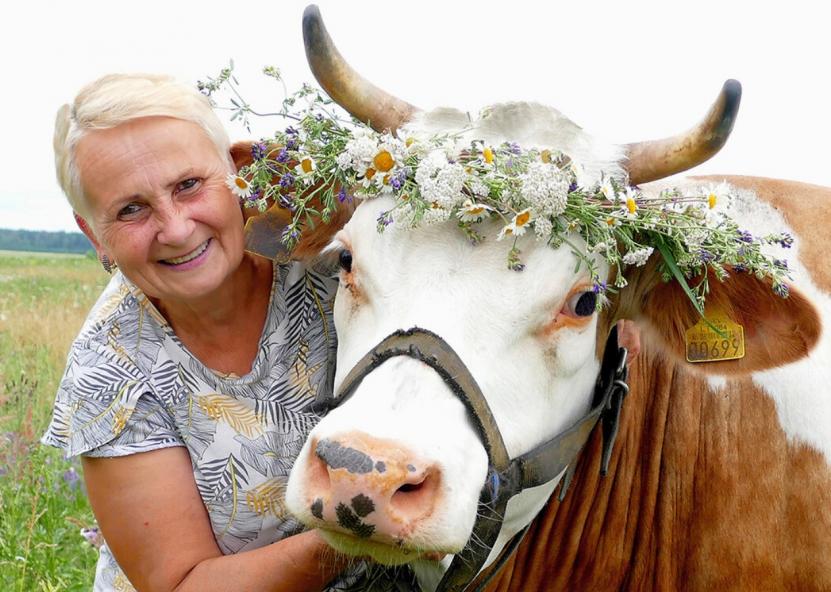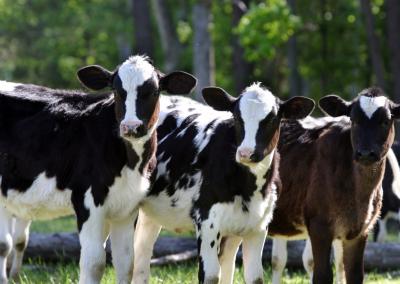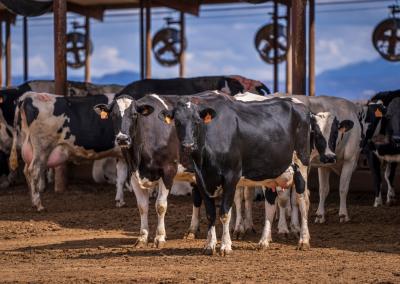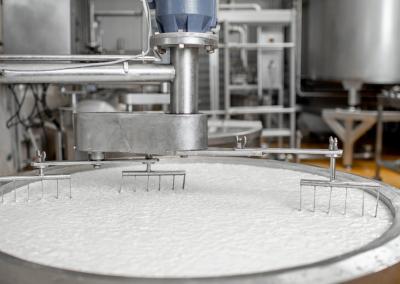Small dairy farms give up - tired of working from an idea
„No matter how much I love my cows, I will have to sell them“, — sighs Sandra Bieliauskienė, a farmer from Meilūnai village. She has kept dairy cattle for many years, she said, but it has never been as bad as it is now.
Hands downAccording to Ms Bieliauskiene, she plans to say goodbye to her five Jersey crossbreds this autumn. I'll keep them through the summer, but no more, no, no, no, no...“ “ — crosses her arms.
She is considering keeping her only cow, named Tapke, for her own use, which produces fat and protein-rich milk to make a delicious cheese to go with her coffee.
The reason why she decided to give up the dairy farm, she says, is simple — it doesn't pay to work for nothing. For milk, we, the small ones, are paid only a hare's tears - 18 cents per kilo. The cost of preparing the feed, hiring the machinery, buying feed additives, medicines and everything else... all from an idea. For example, where have you seen a calf sold for 116 euros, when it cost 20 euros to inseminate the cow, 20 euros for the so called "earrings"... A calved cow needs a variety of supplements to help it recover... That's 50 euros, thank goodness. If you include your work, the time you have spent, the health you have sacrificed for the farm... It's better not to count," the farmer said emotionally.
S. Bieliauskiene is also saddened by the inequality of why large farms are paid twice as much for milk. „I do not understand and will not understand such a policy why milk produced by large farms is paid more. It is a blow to the heart of the rural man who has held on to his last legs to avoid having to claim state benefits. It is so painful to see that there will be nothing left in that village. Medical centres are being destroyed, buses are running less and less, there are almost no job opportunities if you don't have your own car, and you can't live on milking cows," says S. Bieliauskienė.
Strict requirements will come
Tadas Micikevičius, chairman of the Biržai District Farmers' Union, says that it is generally surprising how small farms are still holding their own in the face of such unfavourable policies. „I would say that all farms are holding on to hope“ because if it wasn't there, farming would have been finished a long time ago“, — T. Micikevičius is convinced.
He notes that if the country's authorities do not act, it will be even worse. Farmers will be overwhelmed by strict requirements that are excessive and, for small farms in general, difficult to implement. It is very simple to say — make cheese and curd, sell it in the markets. In order to do that, you have to invest EUR 15,000-20,000 in equipment, and at that price if you have your own premises. How many years will you need to work to make the investment worthwhile and profitable?
Five years is not enough. And then there are the piles of permits and other bureaucratic burdens... In my opinion, the bar should be lowered," commented T. Micikevičius.
According to the Chairman of the Biržai District Farmers' Union, there is a lack of a more favourable attitude of the government towards farmers. "What in Poland, Latvia and Estonia is just a recommendation, here it is an obligation. We want the government to communicate with farmers not through windows," he said.
Two paths – liquidate or expand the farm
Vaidutė Stankevičienė, a farmer and member of the Lithuanian Milk Producers Association, said that there is currently one small farmer in Biržai district who has a few cows and produces cheese and other dairy products. So the figures show that such an example is not contagious — small farms are going the other way — they are liquidating or... expanding their land areas.
„Dairy farms have always been bad in Lithuania. Even though we are in the European Union, milk purchase prices have always been the lowest compared to other countries. We are second only to Latvia, where prices are even lower. It is not very comforting to know that we are second from the bottom in terms of milk purchase prices. It is impossible to survive with just a few cows. Only small farms whose owners have additional earnings, for example, they are employed and their employer pays their health insurance and other taxes, are holding on. One cow, according to today's estimates, generates an average income of around a dozen euros... Therefore, in order to survive on a dairy farm, you need to keep at least fifty cattle“, — said V. Stankevičienė.
Young people are hesitant to take over farms
„Indeed, the decline is happening and it is inevitable, and the main reason is that young people are hesitant to take over their grandparents' or parents' dairy farms, because it is a hard job that „binds“ a person. The second reason is the low purchase price of milk," said S. Balčiūnienė.
According to the data of Biržai district municipality, small dairy farms are predominant in our region (162 farmers keep 1 to 2 cows, 85 keep 3 to 5 cows, 53 keep 6 to 10 cows, 56 keep 11 to 20 cows).
„The municipality provides all possible assistance, consultations, helps to fill in declarations, necessary registers“, — added S. Balčiūnienė.












































































































